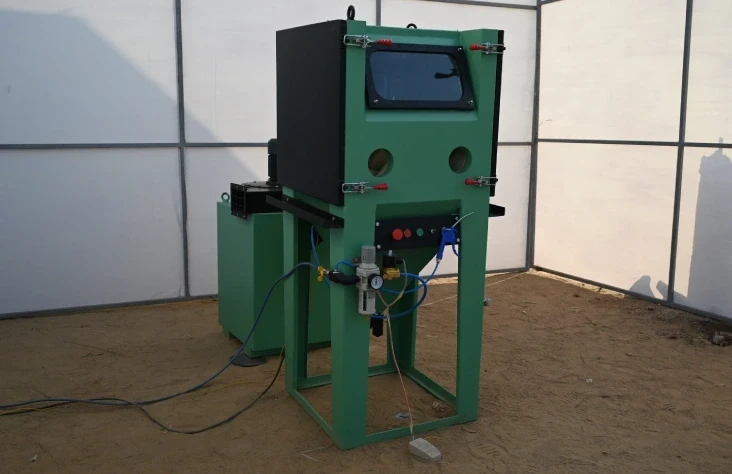Wet Blasting Machine in India
Specifications of Wet Blasting Machine in India
| Product | Wet Blasting Machine |
| Material | Mild Steel |
| Agitation | Pneumatic |
| Grade | Semi-Automatic, Manual |
| Water Flow | Mechanical |
| Air Flow | 200 CFM |
| Power Consumption | 3 Phase 1.5 HP |
| Brand | Micro Blaster |
| Color | As per client requirement |
| Delivery Time | 1-2 Weeks |
| Packaging Details | Polly Pack With Bubble Packing |
| Delivery Type | Land / Sea / Air |
Application of Wet Blasting Machine in India
- Automotive: Engine parts, wheel rims, mold cleaning .
- Aerospace: Delicate alloy deburring, composite prep.
- Medical Devices: Implants and surgical tool cleaning.
- Electronics: PCB hole cleaning, connector prep.
- Glass Etching: Decorative and architectural finishes.
- Stone & Concrete: Case-sensitive graffiti or weathered surface cleaning.
- Foundries: Fine sand removal from castings.
Wet Blasting Machine in India: Complete Guide
A wet blasting machine in India, also called a wet abrasive blasting system, vapor honing equipment, or hydro-blaster, uses a mixture of water and abrasive media to clean, deburr, and prepare surfaces. In India, wet blasting machines are gaining popularity across industries automotive, aerospace, foundries, electronics, and decorative glass, because they offer gentle yet effective surface treatment, dust-free operation, and fine surface finish.
Why Choose Wet Blasting Over Dry Sandblasting?
- Dust suppression: Water traps abrasive dust, making it nearly dust-free, safer for operators and clean-room environments.
- Surface lubrication: The water forms a cushion, reducing surface damage and minimizing abrasive wear.
- Precise finishing: Allows use of ultra-fine media (3 µm), ensuring high precision on delicate parts.
- Cleaner parts: Abrasive residue is washed off instantly, leaving a cleaner surface.
- Dust explosion safety: Eliminates the fire and explosion risk posed by airborne dry particles.
- Flash corrosion control: Use of rust inhibitors or rinses curbs immediate corrosion on mild steel.
- Environmentally friendly: Low dust and water recycling make it eco-friendly.
Types of Wet Blasting Machines
- Manual Wet Blasting Cabinet
An operator uses a slurry gun inside a sealed cabinet. Great for batch work on small parts. Ideal for jewellery, PCBs, and plastic molds.
- Automatic Wet Blasting Machine
Motorized turntables or nozzle-tracking systems automate chassis or shaft cleaning, ensuring consistent, high-volume throughput.
- Wet Blast Booth / Vapor Honing Room
Walk-in booths with multiple guns, suited for large parts like tanks and marine components.
- Handheld Wet Blasting Unit
Compact, portable units for field use, like graffiti removal or small-scale surface prep.
- High-Pressure Hydro/Abrasive Jet
Delivers up to 10,000 PSI for industrial cleaning; effective but slower than dry blasting.
Main Components of Wet Blasting Machine
- Sand Blast Cabinet / Chamber: Built from steel, lined with wear-resistant tiles, with view windows and LED lights.
- Slurry Pump: Converts water and media into a blastable mix.
- Wet Blast Nozzle: Ceramic, tungsten, or boron-carbide nozzle; some systems use a static-free design.
- Slurry Tank / Media Hopper: Collects and recycles water/media mixture.
- Mist Collector / Dust Extractor: Maintains clean air via dedicated filters.
- Turntable / Conveyor: Enables automatic part rotation and exposure to spray.
- Control Panel & PLC: Enables programmable blasting cycles and remote control.
- Water Recirculation & Filtration: Closed-loop recycling to minimize water use.
- Compressed Air System: Supplies controlled PSI; moisture separators included.
- Safety Interlocks & Light Curtains: Doors lock during operation; emergency stops included.
- Rust Inhibitor System: Optional dosing pumps to prevent flash rusting.
Advantages of Wet Blasting Machines
- Dust-Free Operation: Keeps workspace clean and safer.
- Gentle Treatment: Protects thin or heat-sensitive parts.
- Fine Surface Finish: Eliminates burrs and sharp edges.
- Multi-functionality: Cleans, deburrs, degreases, and peens.
- Lower Media Consumption: Reuse rates reach 95 % with proper filtration.
- Environmentally Safe: Less dust, less water, minimal waste.
- Safe for Hazardous Surfaces: Eliminates static buildup and hides ignition risk.
© 2025 All right reserved.

